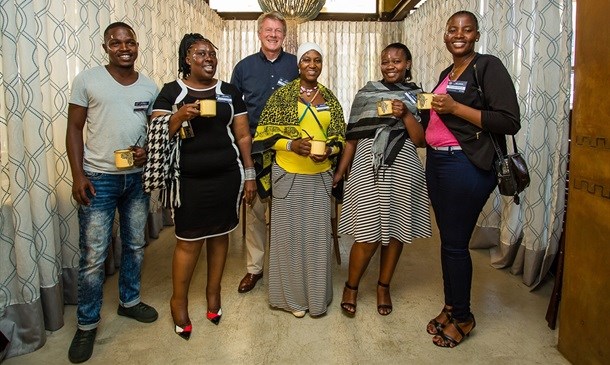The Parmalat Phuma Phambili programme, initiated in 2015, aims to work with emerging fast food and retail businesses as a business enabler, giving these township startups a much-needed competitive advantage. It has honoured five township entrepreneurs for their outstanding efforts in successfully growing their retail and fast food businesses and as a direct result, creating more jobs for members of their local communities, at an event held at Moyo, Melrose Arch.

Luyanda Kunene (on behalf of Betty Ndawonde), Doris Matatanya, Paul Verhaak, Busi Dladla, Mrs Babie (on behalf of Pule Babie) and Maryjane Ngwenya.
In 2016, businesses participating in the programme were assessed against a combination of the following elements:
• Business growth as a direct result of stocking and selling Parmalat Cheese Slices;
• Job creation as a direct result of selling its cheese slices and growing the employee base accordingly;
• Use of cheese slices branding and items (such as signage and fridges) in growing the business in a positive way through increased turnover and visibility
The winners
The winners of the second annual Parmalat Phuma Phambili programme are:
• Betty Ndawonde of Zakhele Fast Food in Dobsonville, Gauteng
• Busi Dladla of Zikhiphani Fast Food in Senaoane, Gauteng
• Pule Babie of Pule’s Fast Food in Naledi, Gauteng
• Doris Matatanya of PKP Kitchen in Limpopo
• Maryjane Ngwenya of Kota Land Fast Food in Mpumalanga
These entrepreneurs recorded phenomenal results in 2016, with sales increases ranging from 55% at Pule’s Fast Food to 317% in the case of Zakhele Fast Food. Significant employment opportunities were created because of these increases, including the hiring of 12 new staff at Zakhele, eight additional staff at Zikhiphani and five full-time staff and two part-time staff members at PKP Kitchen.
Full support
Not only was Parmalat’s goal to become the preferred, pre-packaged and branded single slice cheese used in township Kotas but the company also strived to support and promote entrepreneurs and small businesses in South Africa’s informal market.
“Parmalat Phuma Phambili isn’t a handout. It’s our salute to these entrepreneurs with forward-thinking attitudes and our commitment to supporting them to get ahead and thrive both in business and in life,” says Parmalat CEO, Paul Verhaak.
The programme involves informal fast food and retail outlets in selected provinces that make and sell Kotas (township version of a bunny chow). These businesses have to register for the programme; buy and use Parmalat Cheese Slices in their Kotas, and then monitor and track their sales as a result of using the cheese slice in their meals.
The incentive for businesses to use Parmalat Cheese Slices is the opportunity to gain access to invaluable outlet support from Parmalat, to help them grow their businesses. This is in the form of access to improved equipment and branding; enhanced marketing collateral; and more efficient production to help entrepreneurs achieve better margins. Programme participants also receive items such as TVs, fridges and Chromadek signage boards to help give their businesses a more competitive edge.
“We’re inspired by dreams and ambitions of these entrepreneurs and people who do great things with limited resources, as so many of our programme participants do. That is why we are passionate about supporting and collaborating with small businesses in the informal market. We want to motivate and help fuel their entrepreneurial spirit. Because ultimately, small businesses are the economic heartbeat of South Africa and they need all the help they can get in not just surviving, but thriving,” says Andre Mahoney, Parmalat marketing executive.
“Based on the success of the programme to date, the company will increase its investment and commitment to the campaign and expand the programme into KwaZulu-Natal in 2017 and plans are also underway to incorporate the Eastern Cape later on in the year.
































